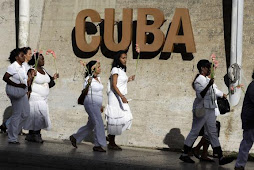Fernando Dámaso, Translator: Unstated
Writing on historical things, I dusted off the 19th Century in Cuba, and
with it the related currents of annexation, reform, autonomy and
independence. Elaborating on each of them, I came to some controversial
conclusions, and going back in time, I carried them forward to our time,
where some have become reality, although, in this case, changing the
name but not the content.
Given the widespread crisis that engulfs the Cuban nation, a great
majority agree, ever more strongly, on the need to introduce deep
reforms of an economic character, without ignoring some, although tepid,
of a social and political character. These new reformists, as is usual,
have been resisted by the authorities, who stigmatize them, their
preferred method. Not content with that, they have gone even further and
enacted constitutional articles rejecting any possibility of change and
making immobility eternal. To think that with laws and decrees they can
put the brakes on social development is totally absurd, not to mention a
denial of the dialectic, but it is a part of the everyday alienation of
our tropical socialism.
From the official speaker's platform, the defense of their positions
has centered on raising the flag, once more, of independence as an
indispensable condition for national survival. Although it is a word
that sounds good, and has been too much used, to me it raises great
doubts. After obtaining independence in 1902, our country enjoyed a very
few years of true political peace, emphasizing the fratricidal struggles
of the first quarter century, the dictatorship of Machado, that of
Batista and the current model.
That built, despite all the setbacks, in the first fifty-six years of
independence, has been destroyed in the last fifty-three years, also
called, coincidentally, independence, and where the little voice of
you-know-you has been present from the time you wake up until you go to
sleep, including on holidays.
Furthermore, according to the official propaganda, in those first
fifty-six years we weren't independent, because we were subject to the
government of the United States of America. Hence the derogatory
epithets of "psuedo-republic," "half-republic," "neo-colonial," etc. In
the great majority of the other years, if we look at reality, we weren't
independent either as we were subject to the Soviets.
Perhaps — excuse me patriots — we would have been more developed and
happier joined with the United States. At least we wouldn't have had so
many historic potholes, nor so many dictators, nor would we have lost
nearly half a century, or fallen into the current devolutionary process
that has brought the country back o the early 20th Century.
To speak of annexation today is an absurdity, not because it would be so
terrible, but because it doesn't fit with this time: currently the terms
used are integration and globalization, which represent a free union of
independent countries, in terms of their economy, politics, social
projects, etc. So, over the years, the sacrosanct independence of the
19th and 20th Centuries, is not so much so in the 21st Century, and has
lost its validity, giving way to reformism, utilizing the denominator
that is used to name it. Everything changes and this is a demonstration
of it.
Clinging to the past, recycling words discarded by time, is just useless
entertainment. It imposes the new and, for that, changes are needed:
without changes, without renovation, there are no solutions nor
development. The criticized capitalism has demonstrated its capacity to
transform itself, abandoning the outdated and accepting the new. The
vaunted socialism was not capable of doing it and disappeared. To try to
revive it by tweaking it is to lose even more time. To revisit the old
banners of independence, sovereignty at all costs, and narrow
patriotism, is to lack a historical perspective, and what's more, if it
is done in good faith, a mistake.
November 16 2011





No comments:
Post a Comment